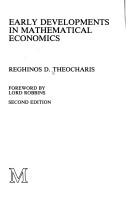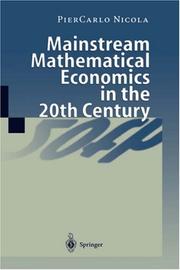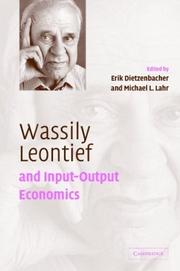| Listing 1 - 5 of 5 |
Sort by
|

ISBN: 0333273443 9780333273449 Year: 1983 Publisher: London
Abstract | Keywords | Export | Availability | Bookmark
 Loading...
Loading...Choose an application
- Reference Manager
- EndNote
- RefWorks (Direct export to RefWorks)
Quantitative methods (economics) --- Economics, Mathematical --- Mathématiques économiques --- History --- Histoire --- History. --- Mathématiques économiques --- Economics, Mathematical - History

ISBN: 354067084X 3642086381 366204238X 9783540670841 Year: 2000 Publisher: Berlin Springer
Abstract | Keywords | Export | Availability | Bookmark
 Loading...
Loading...Choose an application
- Reference Manager
- EndNote
- RefWorks (Direct export to RefWorks)
To write everything about nothing, or to write nothing about everything: this is the problem. (Anonym, circa 1996-97) The first idea to write a book on M athematical Economics, more or less ordered in a historical sequence, occurred to me in 1995, when I was asked, by Istituto delta Enciclopedia Italiana, to write the entry "Storia dell'economia 1 2 matematica" , for the collective work "Storia deI XX Secolo". I thought that it would be interesting to elaborate on the text presented to the editors, to turn it into a book aiming at giving a panorama of what, in my opinion, are the main 20th century contributions to mathematical eco nomics. Of course, only a narrow set of the contributions made by economic theorists could be included, both for space limitations and necessity, because 3 of the limited competence of any single author. For instance, I have paid very limited attention to what is now called Macroeconomics, and also to Game Theory, which actually has grown so much as to acquire scientific in dependence as a living branch of applied mathematics. For the same reason, I have also left completely untouched such fields as Mathematical Finance, Public Economics, Theory of Taxation, etc. I have always based my presentation on published material only, assuming that what is contained in working papers still waits to be confirmed, possibly in the first years of the 21st century.
Quantitative methods (economics) --- Economics, Mathematical --- History --- Economic theory. --- Computer mathematics. --- Economic Theory/Quantitative Economics/Mathematical Methods. --- Computational Mathematics and Numerical Analysis. --- Computer mathematics --- Electronic data processing --- Mathematics --- Economic theory --- Political economy --- Social sciences --- Economic man --- Economics, Mathematical - History - 20th century
Book
ISBN: 3642110444 3642110452 Year: 2011 Publisher: Berlin ; New York : Springer : Firenze : C.I.M.E. Foundation,
Abstract | Keywords | Export | Availability | Bookmark
 Loading...
Loading...Choose an application
- Reference Manager
- EndNote
- RefWorks (Direct export to RefWorks)
S.N. Afriat: Economic transformation.- M. Arcelli: Modelli aumentati e principio di corrispondenza nella metodologia di Andreas.- H. Kuhn: Some remarks on games of fair division.- H. Kuhn: On two theorems in international trade.- A.G. Papandreou: Theory, construction and empirical meaning in economics.
Economics, Mathematical -- Computer programs. --- Economics, Mathematical -- History. --- Economics, Mathematical. --- Business & Economics --- Mathematics --- Physical Sciences & Mathematics --- Economic Theory --- Algebra --- Economics, Mathematical --- Econometrics --- Mathematics. --- Game theory. --- Game Theory, Economics, Social and Behav. Sciences. --- Math --- Science --- Games, Theory of --- Theory of games --- Mathematical models
Book
ISBN: 9782356710024 2356710027 2356710051 9782356710055 2356710906 2356711961 Year: 2008 Publisher: Paris Presses de l'Ecole des mines
Abstract | Keywords | Export | Availability | Bookmark
 Loading...
Loading...Choose an application
- Reference Manager
- EndNote
- RefWorks (Direct export to RefWorks)
Le gouvernement des hommes use et abuse de « l’argument statistique ». Avec l’émergence d’un État néo-libéral, l’action publique s’appuie de plus en plus sur des indicateurs chiffrés qui fournissent des évaluations de la performance des différentes actions politiques. Des « palmarès » variés connaissent une grande diffusion (souvent sous l’appellation anglo-américaine de benchmarking), en hiérarchisant les lycées, les Universités, et même les nations. Ce passage par la quantification, loin de fournir une image neutralisée des phénomènes, les transforme et les performe. Ce livre propose des études de cas précis, enquêtes sur le budget des familles, commissions du plan, statistiques locales ou comptabilité nationale, analysant la production des statistiques publiques et leur usages par les autorités publiques. Et l’on verra comment la statistique s’est imposée à la fois comme un outil de preuve, dans les sciences empiriques, et comme un outil de gouvernement, selon l’intuition que Foucault avait déjà présentée dès les années 1970 sous le nom de « gouvernementalité ».
Methods in social research (general) --- Statistical science --- Econometrics --- Social sciences --- Economics, Mathematical --- Econométrie --- Sciences sociales --- Mathématiques économiques --- History --- Statistical methods --- Histoire --- Méthodes statistiques --- Statistics --- Sociology --- Economics --- Social aspects --- Sociological aspects --- Social Sciences --- Statistics - General --- Économétrie --- Statistiques sociales --- Enquêtes sociologiques --- History. --- Sociological aspects. --- AA / International- internationaal --- 301 --- Techniek van statistische inlichtingen. Organisatie van de statistische enquêtes. Statistische kritiek. --- Econométrie --- Mathématiques économiques --- Méthodes statistiques --- Histoire. --- Méthodes statistiques. --- Techniek van statistische inlichtingen. Organisatie van de statistische enquêtes. Statistische kritiek --- Statistics - Social aspects - History --- Econometrics - History --- Sociology - Statistical methods - History --- Social sciences - Statistical methods - History --- Economics - Sociological aspects --- Economics, Mathematical - History --- École nationale de la statistique et de l’administration économique (ENSAE) --- statistique --- histoire des statistiques sociales --- quantification --- Économétrie --- Enquêtes sociologiques --- Méthodes statistiques.

ISBN: 0521832381 0521049431 0511185723 0511184891 0511327021 0511493525 128044942X 0511187564 0511186630 1107148820 9780511187568 9780521832380 9780511184895 9780511186639 9780511185724 9780511493522 9781280449420 9786610449422 6610449422 9780511327025 9780521049436 Year: 2004 Publisher: Cambridge Cambridge University Press
Abstract | Keywords | Export | Availability | Bookmark
 Loading...
Loading...Choose an application
- Reference Manager
- EndNote
- RefWorks (Direct export to RefWorks)
Wassily Leontief (1905-1999) was the founding father of input-output economics, for which he received the Nobel Prize in 1973. This book offers a collection of papers in memory of Leontief by his students and close colleagues. The first part, 'Reflections on Input-Output Economics', focuses upon Leontief as a person and scholar as well as his personal contributions to economics. It includes contributions by Nobel Laureate Paul A. Samuelson who shares his memories of a young Professor Leontief at Harvard and ends with the last joint interview with Wassily and his wife, to date previously unpublished. The second part, 'Perspectives of Input-Output Economics', includes theoretical and empirical research inspired by Leontief's work and offers a wide-ranging sample of the state of interindustry economics, a field Leontief founded. This is a strong collection likely to appeal to a wide range of professionals in universities, government, industry and international organizations.
National accounts --- Leontief, Wassily --- Economics --- Economists --- Economics, Mathematical --- Business cycles --- Input-output analysis. --- History --- History. --- Mathematical models --- Leontief, Wassily W., --- Business, Economy and Management --- AA / International- internationaal --- 305.4 --- -Economists --- -Economics, Mathematical --- -Business cycles --- -Input-output analysis --- 339.23092 --- Interindustry economics --- National income --- Input-output tables --- Economic cycles --- Economic fluctuations --- Cycles --- Financial crises --- Mathematical economics --- Econometrics --- Mathematics --- Social scientists --- Economic theory --- Political economy --- Social sciences --- Economic man --- Econometrie van de inkomensvorming, de spaarvorming, de kapitaalvorming. Input-output tabellen. --- -History --- Accounting --- Methodology --- Input-output analysis --- Mathematical models&delete& --- Econometrie van de inkomensvorming, de spaarvorming, de kapitaalvorming. Input-output tabellen --- Leontief, Wassily, --- Leontʹev, Vasiliĭ, --- Leontʹev, V. --- Economics - United States - History - 20th century. --- Economists - United States - Biography. --- Economics, Mathematical - History. --- Business cycles - Mathematical models - History. --- Leontief, Wassily W., - 1906-1999
| Listing 1 - 5 of 5 |
Sort by
|

 Search
Search Feedback
Feedback About UniCat
About UniCat  Help
Help News
News